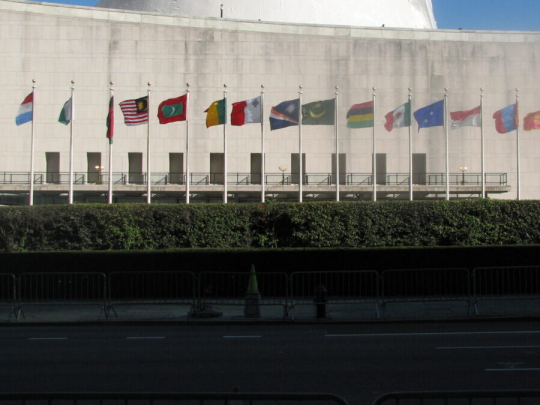Biden’s foreing policy team is not a New Year’s ‘World Peace’ wish

Biden’s election has been so far celebrated by democrats as a promising return to sanity in US politics. Trump’s foreign policy of withdrawal of international cooperation and of hostility and escalating tensions with China, North Korea and Iran, left the rest of the world with the hope that the next US president just wouldn’t start a new war. Ironically enough, Trump didn’t start any. Although he came very close to doing just that by the assassination of Iran’s top general, Qassem Suleimani, generally speaking, his policy in the world and in the Middle East, in particular, has been one of withdrawal, both politically and militarily.
Obama’s record, on the contrary, is much more stained with belligerent policies. Through his drone program and his interventions in Pakistan, Afghanistan, Iraq, Syria, Libya, Somalia, Yemen and Sub-Saharan Africa, Obama oversaw ten times more air strikes than George W. Bush, dropping 26.171 bombs in 2016 alone, killing hundreds of civilians. On that same record is the destruction of Libya and a large participation in the destruction of Syria, both of which were key elements to the outbreak of the refugee crisis in 2015. But Obama wasn’t alone in this. His top team included his two consecutive secretaries of defense, Robert Gates and Chuck Hagel, his secretary of State, Hillary Clinton, and his vice president, now president-elect, Joe Biden.
One foot in the pentagon, the other in the arms industry
Now Biden has completed his choices for his own team, soon to come into office, and as far as world peace is concerned, they don’t look very promising. Starting off is Biden’s pick for Secretary of Defense, General Lloyd Austin. Austin happens to be on the board of Raytheon Technologies, a mega-arms contractor benefitting from huge contracts to the Pentagon.
Until last October, Austin held half a million dollars worth of shares in Raytheon, which is also one of the biggest arms providers to Saudi Arabia, who has been massively bombing Yemen since 2015, effectively destroying the country and causing a humanitarian crisis, while committing countless war crimes against civilians in the process. Austin’s nomination for the job isn’t only a conflict of interests, but also a clear undermining for chances of ending the Saudi war in Yemen.
Advicing bombs, and anti-Russia policy
In the same line, Biden has chosen Jake Sullivan to advise him on National Security. Sullivan was former advisor to Hilalry Clinton as Secretary of State under the Obama administration, pushing hard for military intervention in Libya, and advocating for a similar one in Syria. In her memoirs entitled “Hard Choices”, Hillary Clinton said that Sullivan “was on my side everywhere I went”. But his advice isn’t limited to US officials like Clinton. Sullivan is also a member of the advisory council of the “Alliance for Securing Democracy”, a trans-Atlantic, anti-Russia think tank that advocates against Russian bots and what it sees as Russian propaganda undermining Western democracies. Now his anti-Russia, hawkish war advice will be whispering in Biden’s ear.
Drones, torture cover-up, and arms industry money
Then comes Avril Haines, Biden’s choice for the job of director of National Intelligence. Haines, who started her career as a bookshop caffé owner, living the hipster dream, shifted early on to work in government. In just over a decade she became the CIA’s deputy director under Obama, where she worked on providing the legal framework for Obama’s drone program, that killed hundreds of civilians. Then in 2015, Haines was tasked with determining if CIA’s staff would be disciplined for hacking the senate’s computers and destroying evidence of US torture, during the senate’s work on preparing its report on torture. Haines decided that they would not be punished, and worked on protecting the implicated staff.
Haines is also a consultant for Palantir Technologies, a data-mining firm accused of assisting the Trump administration in the implementation of the infamous immigrant detention program. In addition, she is on the board of the Center for New American Security. A security and defense policies think-tank, funded by large arms corporations like Lokheed Martin and Northrop Grumman.
Selling war to the senate, and war products to the pentagon
But the most concerning of all Biden’s nominations is his upcoming Secretary State, Antony Blinken, who had served as deputy Secretary of State under Obama. Not only is he a hard-line supporter of military intervention in both Libya and Syria, but he also praised the Saudi campaign in Yemen, despite all its war crimes record and all the humanitarian crisis it has caused and continues to exacerbate. Blinken’s enthusiasm for foreign military action dates back at least to 2003. In that year, Blinken was an advisor on foreign policy to then-senator Joe Biden. when he voted for going to war in Iraq. At the time, Blinken played a key role in securing the democrat’s support for the war in the senate.
Today, Antony Blinken is a founding share-holder in WestExec Advisors consultant firm, established in 2017. The company offers, quoting its own website: “unique geopolitical and policy expertise to help business leaders make the best decisions in a complex and volatile international landscape”, using: “unmatched networks in defense, foreign policy, intelligence, economics, cybersecurity, data privacy, and strategic communications”. What this practically means, according to the Project on Government Oversight: “helping defense corporations to market their products to the pentagon and other agencies”. WestExec gives consultancy to diverse clients, with whom it signs non-disclosure agreements. Nevertheless, some of its clients have been made public. One of them is Shield AI, an Israeli military artificial intelligence and drone surveillance company. This is more significant in light of Biden’s own record in securing military aid to Israel and his pledges to maintain it.
A team for interventionism
Generally speaking, the new Biden team for foreign policy is a mixture of radical interventionist and militarist views, arms money influences, conflicting interests and revolving doors between the different areas of the war business. As democrats urge to drop the curtain on the Trump era, characterized by strategic withdrawal, especially military withdrawal from the Middle East, Biden seems to have put-up a team designed to undo the impact of Trump’s withdrawal, with its exact antidote: more interventionism.
An interventionism that has proven to be destructive and catastrophic for millions of people, from Libya through Palestine, all the way to Afghanistan, across endless remains of cities and towns, still smoking from the passing of the last US foreign policy experiment, expecting the arrival of the new one.
- Source : Qassam Muaddi


















